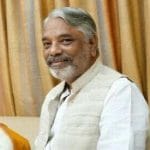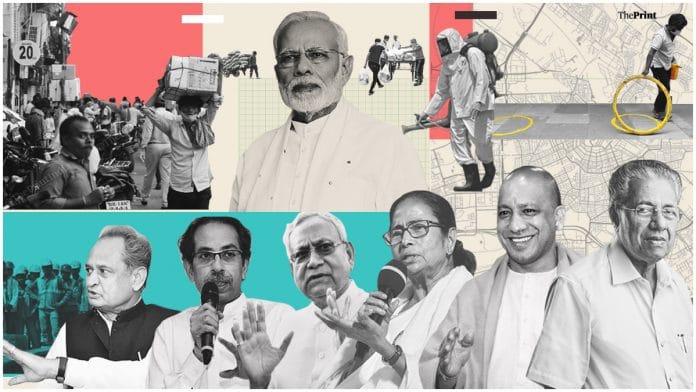Prime Minister Narendra Modi Monday held a video conference with chief ministers to discuss the Covid lockdown exit strategy. The states have asked for more powers from the Centre for battling the crisis on the ground, especially demanding the authority to decide the Covid zone categorisation. The demand raised by Punjab CM Amarinder Singh also got the backing of BJP-ruled Haryana. Delhi CM Arvind Kejriwal suggested that the categorisation be done on the basis of containment zones, and not district-wise.
ThePrint asks: Are Indian states capable of marking Covid zones and planning their own exit strategies?
Covid-19 crisis demands coordination between states; Centre should also provide technical support
 KK Rao
KK Rao
TRS leader and Member of Rajya Sabha from Telangana
States know their land better than those sitting in far off places. They have access to first-hand assessment of the Covid situation on the ground and analytical data of the dynamic circumstances. States are therefore in a better position than the Centre to demarcate their own zones as red, orange and green.
While they should be in the driver’s seat, they will definitely need to coordinate with neighbouring states. After all, no state operates in total isolation and once inter-state travel via trains and flights restarts, they will have to band across borders. For example, when Andhra Pradesh allowed liquor shops to reopen we were wary it would trigger smuggling across state borders. It eventually prompted us, the Telangana government, to allow our own liquor shops to reopen.
Even when migrant workers in Maharashtra were trying to return to their home in Tamil Nadu, they had to cross two or three states. In situations like these, coordination between states is key.
The Centre also has a role to play in providing technical support, funds, and equipping the states with improved health infrastructure.
Centre’s responsibility is to provide funds to states, not issue a one-size-fits-all guideline
 Dinesh Trivedi
Dinesh Trivedi
TMC leader and member of Rajya Sabha
This question is redundant — it’s like asking someone if they’re capable of running their own house. If the answer is no, then they should not be running their house and somebody else should be given the charge.
Being a diverse country, India works on a federal structure, which has been evident during the Covid-19 crisis. We are seeing the situation manifest at different levels within a city, from the district-level to booth-levels. This has called for micromanagement at the booth-level where local representatives/state administrations know each household. In some ways, states themselves have had to decentralise to fight the coronavirus pandemic.
The central government must let go of political agendas and put trust in chief ministers dealing with acutely local situations. Bihar CM Nitish Kumar is not going to be implementing the same orders in his state as Punjab CM Capt. Amarinder Singh. Without a doubt, state administrations know which areas are more densely populated, which are more disciplined and have better education levels and which are on the verge of becoming Covid hotspots. A one-size-fits-all guideline from the Centre overlooks these nuances.
The duty and responsibility of the Centre should be limited to providing necessary funds and technical materials to states as they exit the Covid lockdown.
States can handle demarcation of containment zones; Centre knows little about ground realities
 Shailaja Chandra
Shailaja Chandra
Former secretary, Ministry of Health & and Family Welfare
Indian states are perfectly capable of handling demarcation of containment zones. The states and districts know the topography and density of populations right down to the talukas, which are called Blocks or sub-divisions, to tehsils and villages. In a way, there’s very little the Centre knows about the ground realities prevailing there. By now, all districts and municipal bodies also know the drill which has been shared over the months.
The National Centre for Disease Control (NCDC) is fully capable of exercising 24×7 surveillance and to extend technical support when needed. The Bhilwara and Kasaragod models have already been shared with all the districts. The health ministry or other central ministries do step in but that’s only when there is an apparent cause for concern.
Centrally prescribing the drill for identification of suspects, testing, quarantining and providing specific items or drugs is one part. It, however, has little to do with the demarcation of containment zones and management of Covid-19 cases therein which is a state responsibility.
The situation is different in urban areas.The spread of disease has received huge impetus because over decades we turned a blind eye to unacceptable levels of human congestion in the slums and other densely packed areas in most cities. Forget Covid, these areas have been ripe for any epidemic to spread, distancing being impossible.
Centre should come up with clear guidelines and give states adequate flexibility to implement those
 K Sujatha Rao
K Sujatha Rao
Former union health secretary
It is important to have clear guidelines and a broad framework within which all states must work once the Covid lockdown is lifted. Otherwise it can get chaotic. Most states do not have the kind of public health capacity that Kerala, Tamill Nadu, Maharashtra or Gujarat have. So it would be useful to have certain epidemiological clarity on containment zones and the type of operations that can be worked out by the states.
Another reason why central guidelines are useful is that there is always scope for political interference. For example, if a place is declared a containment zone with strict lockdown regulations, it could affect an industry or an activity connected to political patronage. Pressures to exempt can arise, which then makes containment efforts difficult.
It is for this reason that while the central government should provide broad guidelines without being too prescriptive, there should be adequate flexibility given to states. That said, it is important to ramp up training and building public health capacity.
In the absence of any guidelines, there is immense scope for arbitrary decision making. The situation shows the urgency to ramp up public health discipline in India.
Modi govt should treat states as responsible partners, and not as delinquents
 Balveer Arora
Balveer Arora
Chairman, Centre for Multilevel Federalism
The relative merits and demerits of multilevel planning versus centralised planning have been long debated among Indian policymakers. Today, information technology gives the illusion that micromanagement is possible, but the intimate knowledge of local conditions at the district-level is indispensable. These are the advantages of having a multilevel federal system.
States need to take full advantage of local self-government bodies in chalking out Covid lockdown exit strategies, so that they feel involved and participate fully, rather than using force to make them comply. They should be treated as responsible partners, not as delinquents to be monitored at each step. The Centre should resist the temptation of political distancing by passing on the blame for negative consequences of central micromanagement to the states.
Inter-state labour migration is an area where the Centre could have shown its macro-management capabilities, but it failed miserably. The Ministry of Home Affairs has become accustomed to issuing long memos of directives. Ideally, general guidelines should suffice, with the local governments filling in the details. Broad principles need to be laid down, with state governments adapting them to local conditions.
Every crisis is also an opportunity to build state capacity, especially since we know that epidemics are going to be a recurrent feature of our lives in the years to come. Despite all the suffering caused by this coronavirus pandemic, if local healthcare systems emerge stronger and receive more investment, at least it would leave something positive for the future.
Also read: UP-MP labour reform: Wooing investors post-lockdown or taking advantage of Covid crisis?
By Pia Krishnankutty, journalist at ThePrint







Why is only one comment visible , when there are more?
Aap kataar mein hain …
Why is my comment still under moderation?
Knowledge and information are the two basics essential for making an informed decision.\
Capabilities of Indian states,of marking Covid zones and planning their own exit strategies will be test for leadership.
Dependence on the Babus giving advise in the routine matters in one thing and the state can run on it without the leader having a better analytical mind.
In times of situation like we are in the quality of the leadership will make or break the state.
So far no state leader appears to be confidently putting up a plan. THE MONEY IS WHAT EACH ONE OF THEM WANTS.
That the states are incapable of working for their own benefits is clear from one thing. Keeping the migrant population happy, reassured and confident, so that they stay and help restart the economy. All the states have failed miserably in this, creating such an atmosphere that the migrants were desperate to leave, even under the most unfavourable conditions. That the states do not have the will or the spine to work for their own benefit is clear. In spite of this show of indifference they have to be trusted to deliver in the process of restarting the economy.
Wonder why the experts who have written their pieces did not point out this glaring in- your- face failure? Maybe political bias, or ossified analytical skills?
What the states need from the Centre is mid air refuelling. For pretty much everything else, they have better knowledge / understanding of local conditions. CM of Punjab has been quite vocal about this. In fact, if the initial lockdown had been decided upon in consultation with them, things would have worked out much better. Notably the issue of migrants wishing to return home.